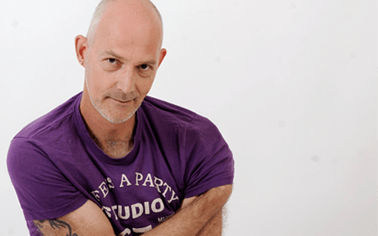Thilo is HIV-positive and suffered from depression. He has now overcome it. In the report, you can find out how he came out of the crisis and how he is doing today.
"HIV-positive" - many people fall into a deep hole after this diagnosis. But not Thilo. It made him want to get a tattoo. "The diagnosis didn't bother me that much at first," reports the man from Brandenburg, "although at the time I expected to live for only five to six years." In 1997, effective HIV drugs were already on the market, but the treatments were not yet as widespread as they are today
Thilo only learnt that he was suffering from depression four years later, when his body began to go on strike. Nothing worked, at least not in the loo. Bladder full, kidney pain - but not a drop came out.
After weeks of several visits to the doctor, a stay in hospital and the insertion and removal of a permanent catheter, the bladder slowly resumed dripping, initially only "with a lot of rest and meditation exercises". Official diagnosis: autonomic neuropathy (nerve disease) of the bladder with an unclear cause - and severe depression.
For four years, Thilo had simply accepted his HIV infection. But with the urinary retention, a point was reached where the doubts crashed over him like a wave. "You ask yourself the question," says Thilo: "Why me?"
The typical worry cycle of depression began. "Your thoughts are like being on a roundabout," Thilo tries to describe the illness. "You can't find a way out, in any direction, neither to have breakfast nor to go to the cinema. I usually had the feeling: then I'd rather do nothing at all, it won't help anyway."
With the help of counselling therapy with a psychotherapist, he managed to break out of this vicious circle. "Just talking about it made a lot of things easier," says Thilo. "By talking, I was able to deal with the issues myself again in peace and discover things that make life more bearable."
In 2011, Thilo experienced the whole thing again - not as a sufferer, but as a relative. His partner René also suffers from depression. Thilo therefore makes sure to give their everyday life together a structure. "You have to set yourself small goals for the day that you can stick to - just don't slip from one corner of the sofa to the other!"
One of their shared rituals is to get up on time to feed their sheep. And the chickens. They have 50 of them and are even members of the poultry breeders' association in the neighbouring town of Neustadt (Dosse). They have been living as a couple in the Brandenburg countryside for several years. Other stages in their daily routine: Breakfast, coffee and a piece of cake at lunchtime, something warm in the evening. In short: sticking to their meals.
This care also includes Thilo reminding his friend to take his HIV tablets. René had stopped taking them at the height of his depression. "The fact that he no longer swears at me when I give them to him is a sign to me that he wants to carry on living," says Thilo.
To maintain his balance, Thilo has sought psychotherapeutic support from his health insurance provider. "It's good to have someone from the outside looking in," he says. "They also discover things that relatives can't or don't want to see." For example, the danger of wearing yourself out in dealing with a depressed partner. "You have to be careful not to take on too much responsibility," explains Thilo. "I try to get on with my own life and not be at René's side from midnight to midnight."
Thilo's own life includes volunteering for the prevention campaign ICH WEISS WAS ICH TU. He was also elected to the Sieversdorf municipal council in May 2014, with the third most votes. "That's a lot for the fact that we just moved here," says Thilo happily. In general, 2014 is a good year: Thilo's health is getting better and better, so he has made the decision for himself: Retirement is not a one-way street. Together with his employer, where he is employed as a works council member on a leave of absence, he has looked at what alternatives are available. A completely new position as housekeeping coordinator and management representative for occupational safety became possible, instead of a part-time position. So things are looking up!

Nevertheless, Thilo has to keep recharging his batteries by recalling positive experiences. One of these fond memories is their wedding in the church in their home village in Brandenburg four years ago. The parish council had unanimously decided that two men were also entitled to a wedding service. "There were almost 150 guests there," says Thilo, half of them invited, the other half curious neighbours from the village. Luckily we had ordered enough cake." Then he thinks for a moment and says: "The wedding and the years together with René are definitely positive experiences."









